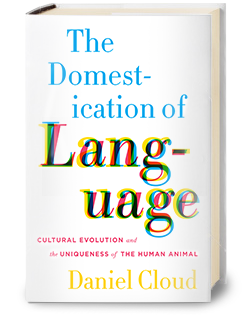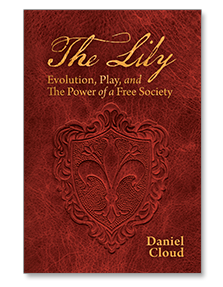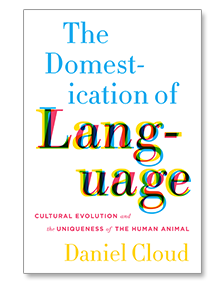The Book
By Daniel Cloud | About the author...
Language did not evolve only in the distant past.
Our shared understanding of the meanings of words is ever-changing, and we make conscious, rational decisions about which words to use and what to mean by them every day.
Applying Darwin’s theory of “unconscious artificial selection” to the evolution of linguistic conventions, Daniel Cloud suggests a new, evolutionary explanation for the rich, complex, and continually reinvented meanings of our words.
The choice of which words to use and in which sense to use them is both a “selection event” and an intentional decision, making Darwin’s account of artificial selection a particularly compelling model of the evolution of words. After drawing an analogy between the theory of domestication offered by Darwin and the evolution of human languages and cultures, Cloud applies his analytical framework to the question of what makes humans unique, and how they became that way. He incorporates insights from David Lewis’s Convention, Brian Skyrms’s Signals, and Kim Sterelny’s Evolved Apprentice, all while emphasizing the role of deliberate human choice in the crafting of language over time. His clever and intuitive model casts humans’ cultural and linguistic evolution as an integrated, dynamic process, with results that reach into all corners of our private lives and public character.
"A superbly original book on an important topic and the most exciting piece of philosophy I’ve read in a long time. Cloud builds on major philosophical work by David Lewis and Brian Skyrms to provide a serious account of the evolution of language that both recognizes the long and complex process that links the prior state (nothing like language at all) to the end state (language of the kinds now in existence) and that responds to the points of greatest difficulty in that process."
— Philip Kitcher, John Dewey Professor of Philosophy, Columbia University
"Starting with David Lewis and Brian Skyrms, Daniel Cloud has done much more than given us a 'just so story' about the evolution of language. He has identified the real obstacles it had to surmount and creatively drawn on the best hard science to show how it must have overcome them."
— Alex Rosenberg, Duke University
"This stimulating and engagingly-written book lucidly defends a remarkable proposal. According to it, just as a breeder of honeybees makes choices that influence the evolution of domesticated bees, all of us -- by choosing which words and practices to employ, and which ones to scowl, chuckle, or roll our eyes at -- actively influence the evolution of our language and culture."
— Adam Elga, Princeton University
Read the first chapter of "The Domestication of Language: Cultural Evolution and the Uniqueness of the Human Animal," by Daniel Cloud
Click on the book above to open full-screen or, read on ISSU.
The Lily: Evolution, Play, and the Power of Free Society by Daniel Cloud
Why does a free society work so well? Are civil rights really indispensable for full modernity? Must we be free because we're prescient, or because we're blind? This book is intended as a contribution to the genre that includes Mill's On Liberty and Locke's Second Treatise of Government.
Why the Oracle is Cryptic
You sometimes hear people say that things would be better if only America were more like China, because without all this democracy and freedom, they can really get things done over there, can really commit to solar power, or nuclear fission, or budgetary discipline, or whatever the person thinks we need more of. Are they right? Historically, absolutely not. Freedom works. People are always saying that kind of thing - Stalin is the future, Louis XIV is just the sort of powerful monarch we should have here in England, the Spartans aren't soft like we Athenians, etc., etc., on and on. In the last four centuries, however, there are very few cases of an illiberal society permanently defeating or outcompeting a liberal one. But why?
Conventional wisdom assumes that it's competition in the market for explicit, rational ideas and plans of action that gives liberal societies their advantage. We must be free because we always are in a position to know what should be done, and just need the liberty to do it. Watching democracy in action, however, soon reveals that many of the plans actually proposed seem to be useless or even counterproductive, that the system in aggregate displays intransitive, inconsistent preferences, and that the people who lead democracies often seem remarkably unimpressive. It's precisely these features that made many Athenians or Florentines doubt that a free society was really a viable option. In their times and places, they were, as it turned out, right. What is it that makes the modern free society, in the last four hundred years, so much more successful? To answer this question correctly, we have to step back a bit, and look at the problem from thirty thousand feet.
Continue reading "Why the Oracle is Cryptic" by Daniel Cloud, Ph.D.
Publisher: Laissez Faire Books (2011)
Language: English
ISBN-10: 0983541418
ISBN-13: 978-0983541417



